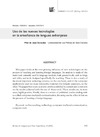Identificador persistente para citar o vincular este elemento:
https://accedacris.ulpgc.es/jspui/handle/10553/11205
| Campo DC | Valor | idioma |
|---|---|---|
| dc.contributor.author | Juan González, Pilar de | - |
| dc.date.accessioned | 2014-01-14T03:30:23Z | - |
| dc.date.accessioned | 2018-03-15T14:26:29Z | - |
| dc.date.available | 2014-01-14T03:30:23Z | - |
| dc.date.available | 2018-03-15T14:26:29Z | - |
| dc.date.issued | 2012 | - |
| dc.identifier.issn | 1133-1127 | - |
| dc.identifier.other | WoS | - |
| dc.identifier.uri | https://accedacris.ulpgc.es/handle/10553/11205 | - |
| dc.description.abstract | This paper looks at the ever-growing influence of new technologies on the process of teaching and learning foreign languages. An analysis is made of the main tools currently used by language teachers, both general tools, such as blogs and wikis, and tools designed specifically for teaching. There is also a study of the most important authoring systems, on the one hand, and of the computer applications used to create interactive materials for didactic purposes, on the other. The paper then scans academic articles published in journals and comments on the results achieved with the use of those tools. These results are, in most cases, highly positive. Finally, there is a review of published studies dealing with so-called computer-mediated communication, focusing on the effect it has on the process of learning a foreign language. | - |
| dc.format | application/pdf | - |
| dc.language | spa | - |
| dc.relation.ispartof | LFE. Revista de Lenguas para Fines Específicos | - |
| dc.source | LFE. Revista de lenguas para fines específicos. Las Palmas de Gran Canaria: Universidad de Las Palmas de Gran Canaria, 1993-.-- ISSN 1133-1127.-- n. 18, 2012, p. 183 | - |
| dc.subject | 570107 Lengua y literatura | - |
| dc.subject | 550510 Filología | - |
| dc.subject.other | On-line teaching | - |
| dc.subject.other | Technology | - |
| dc.subject.other | Computer-mediated communication | - |
| dc.subject.other | Computer tools | - |
| dc.subject.other | Computer Tools | - |
| dc.title | Uso de las nuevas tecnologías en la enseñanza de lenguas extranjeras | - |
| dc.title.alternative | Use of new technologies in the teaching of foreign languages | - |
| dc.type | info:eu-repo/semantics/article | - |
| dc.type | Article | - |
| dc.identifier.isi | 000219403200008 | - |
| dc.compliance.driver | 1 | - |
| dc.identifier.absysnet | 233536 | - |
| dc.identifier.eissn | 2340-8561 | - |
| dc.description.lastpage | 211 | - |
| dc.description.firstpage | 183 | - |
| dc.relation.volume | 18 | - |
| dc.investigacion | Artes y Humanidades | - |
| dc.rights.accessrights | info:eu-repo/semantics/openAccess | - |
| dc.type2 | Artículo | - |
| dc.contributor.daisngid | 7620798 | - |
| dc.description.numberofpages | 29 | - |
| dc.contributor.wosstandard | WOS:Gonzalez, PD | - |
| dc.date.coverdate | 2012 | - |
| dc.identifier.ulpgc | Sí | es |
| dc.description.esci | ESCI | |
| dc.description.erihplus | ERIH PLUS | |
| item.grantfulltext | open | - |
| item.fulltext | Con texto completo | - |
| crisitem.author.dept | Departamento de Filología Moderna, Traducción e Interpretación | - |
| crisitem.author.fullName | De Juan González, Pilar | - |
| Colección: | LFE, Rev. leng. fines específ. n.18, 2012 Artículos | |
Visitas 5
119
actualizado el 11-ene-2026
Descargas
124
actualizado el 11-ene-2026
Google ScholarTM
Verifica
Comparte
Exporta metadatos
Los elementos en ULPGC accedaCRIS están protegidos por derechos de autor con todos los derechos reservados, a menos que se indique lo contrario.
